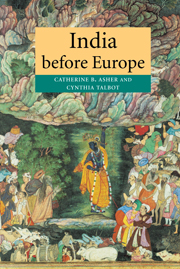Book contents
- Frontmatter
- Contents
- List of illustrations
- List of maps
- Preface
- Glossary
- Place names: alternative spellings
- 1 Introduction: situating India
- 2 The expansion of Turkic power, 1180–1350
- 3 Southern India in the age of Vijayanagara, 1350–1550
- 4 North India between empires: history, society, and culture, 1350–1550
- 5 Sixteenth-century north India: empire reformulated
- 6 Expanding political and economic spheres, 1550–1650
- 7 Elite cultures in seventeenth-century South Asia
- 8 Challenging central authority, 1650–1750
- 9 Changing socio-economic formations, 1650–1750
- Epilogue
- Biographical notes
- Bibliography
- Index
3 - Southern India in the age of Vijayanagara, 1350–1550
Published online by Cambridge University Press: 05 June 2014
- Frontmatter
- Contents
- List of illustrations
- List of maps
- Preface
- Glossary
- Place names: alternative spellings
- 1 Introduction: situating India
- 2 The expansion of Turkic power, 1180–1350
- 3 Southern India in the age of Vijayanagara, 1350–1550
- 4 North India between empires: history, society, and culture, 1350–1550
- 5 Sixteenth-century north India: empire reformulated
- 6 Expanding political and economic spheres, 1550–1650
- 7 Elite cultures in seventeenth-century South Asia
- 8 Challenging central authority, 1650–1750
- 9 Changing socio-economic formations, 1650–1750
- Epilogue
- Biographical notes
- Bibliography
- Index
Summary
The rise of the Delhi Sultanate, although it brought many changes to north India, had little direct impact on the lands south of the Narmada river. Only from around 1300, when the Delhi Sultanate began sending armies down into the peninsula, did the histories of these two parts of the subcontinent start to converge. The military successes of the Delhi Sultanate gave a north Indian state control over portions of south India for the first time in many centuries. Although the Delhi Sultanate did not retain this control for long, its intervention into the affairs of the peninsula was to have long-lasting repercussions. Because a separate state headed by Central Asian Muslim warriors known as the Bahmanis was founded in the Deccan in 1347, the Islamic religion and culture that had taken root in the Deccan under the Tughluq sultans of Delhi continued to flourish in subsequent times. Another significant result of Delhi's military expeditions was the destruction of the existing regional kingdoms of the south. This paved the way for the emergence of Vijayanagara, a new state ruled by indigenous warriors that shaped the society and culture of south India for centuries thereafter. The empire of Vijayanagara is often credited with preserving a distinctly Hindu way of life in south India that had been lost in the north, a misconception that overlooks both the creativity and cosmopolitan nature of the Vijayanagara elite.
- Type
- Chapter
- Information
- India before Europe , pp. 53 - 83Publisher: Cambridge University PressPrint publication year: 2006
- 1
- Cited by



